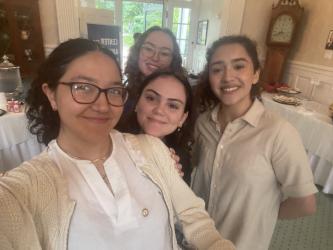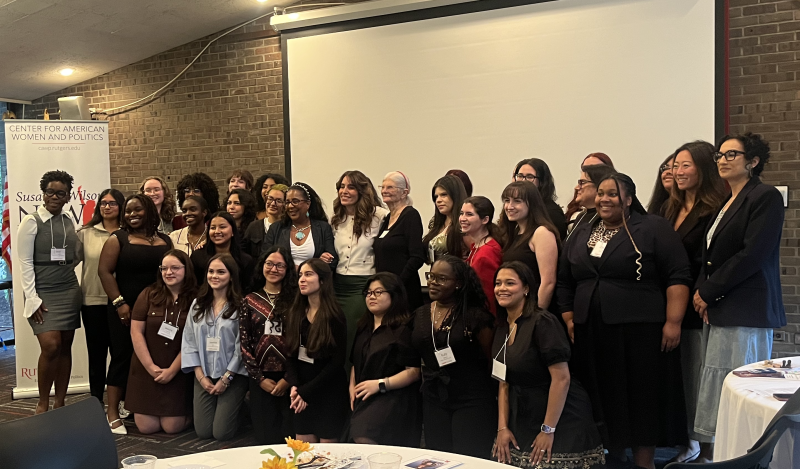Supporting Women's Leadership: Behind the Scenes at NEW Leadership® 2025

Earlier this summer, I had the opportunity to continue working with the Center for American Women and Politics (CAWP) as a returning intern during its flagship leadership training program for college students, Susan N. Wilson NEW Leadership® New Jersey. This five-day residential program educates students about the significant role that politics plays in their lives, introduces them to successful women leaders, and encourages them to become more involved in the political process. Throughout NEW Leadership®, my position behind the scenes allowed me to see a transformation in the participants’ dynamic as the program progressed.
At the start of NEW Leadership®, the students seemed reserved and formed small circles, conversing in pairs or trios. However, they eventually expanded their groups and grew closer, happily eating late-night sweet treats in the hotel lounge or singing karaoke in the drawing room at the Eagleton Institute of Politics. During their hang-outs, I was welcomed into their groups and spoke to some of them about their interests, backgrounds, and experiences. Their knowledge of each other’s accomplishments and personal lives further showed me how they were bonding and developing meaningful relationships.
I was particularly intrigued by Libni Jarib Vizcaino’s journey from home in the Dominican Republic to America, and I admired her for her plans to advocate for multilingualism and foreign language speakers, which she spoke about during her making change presentation, the concluding project of the program. She and the other participants prepared for this presentation with guest speakers and the Faculty in Residence (FIRs), women leaders who serve as mentors and role models that live on campus with students throughout the event. The speakers and FIRs helped students narrow their focus and enhance their oral presentation, and they shared their knowledge of policy to guide students in developing their program projects.
In addition to Libni, I was intrigued by Jasmine Cetin’s background as an accomplished Ukrainian international student and was struck by her balance between being lighthearted and professional when necessary. This balance showed me how NEW Leadership® allows for students to relax and get to know each other during breaks, and lean on the professional skills (like public speaking and networking) they develop during formal sessions. Some of the other students I spoke to were mothers (Janai Washington, a mom of four, and Alyssa Aviles, an independent parent of one), and I admired their abilities to navigate their maternal and academic obligations while committing to the program. Their presence reminded me of the importance of including working mothers’ perspectives in politics; their unique experiences allow them insights to propose policy solutions that reflect women and children’s realities and needs. As the program progressed, my conversations with these students and others made me see a unique community being built in real time. I felt, in some ways, swept up in this community. Toward the end of NEW Leadership®, my supervisor had to gently remind me to stay on task since I was deep in conversation with the participants.

NEW Leadership® concluded with tears from some moving making change projects, bittersweet goodbyes and hugs, and an influx of social media and LinkedIn profiles in a NEW Leadership®-facilitated Groupme chat to stay connected moving forward. This exchange of profiles reminded me of the reflections of Amani Mansour’s, CAWP’s public relations specialist and NEW Leadership® alumna: “It’s where I met my best-friend.” The close connections the participants built in five days will serve as a foundation for long-term friendships, yes, but also powerful networks that they can carry forward with them in their personal and professional lives. In addition to connections, I personally gained insight into the guidance, empowerment, and knowledge students receive from NEW Leadership®.
Throughout the five days, I saw how participants worked individually and collectively in several workshops and group sessions. They worked independently to conceptualize their making change projects at first, and brought these concepts to their Faculty in Residence mentors, who helped enhance their overall projects by teasing out how to turn ideas into action. Prior to the conceptualization phase, they worked in pairs to practice their public speaking and receive feedback. While watching the students, I remembered why programs like NEW Leadership® are necessary: they strengthen skills like public speaking, networking, collaboration, and project planning that students don’t often employ in their coursework. The program also gives them mentorship, insight, and support in an intimate environment that may be difficult to find for many students at large universities. By the end of NEW Leadership®, I was impressed by the students’ inspirational making change presentations. They were evidence of the short, yet meaningful, work they achieved with the help of the FIRs and each other. Their plans to pursue these projects with policymakers highlights the empowerment and agency they felt from the positive, individual feedback they received from experts. As someone who gravitates towards supporting women in politics (rather than being a public figure in politics myself), I felt inspired by the students and program to advocate for my own values to policymakers. The effects of NEW Leadership® on us demonstrate how leadership training programs can inspire or reinforce young people’s desire to enter the political sphere that needs them now more than ever.
By the end of NEW Leadership®, I learned that it’s more than a program — it’s an investment in the future of our leaders. It also serves as inspiration to participants to leave their mark on society. I left with a greater understanding of public service, a new commitment to advocate for my values, and connections with great people and professionals. Like the students, I feel grateful for the opportunity to be a part of a space that welcomes, uplifts, and equips students with the tools they need to lead.

